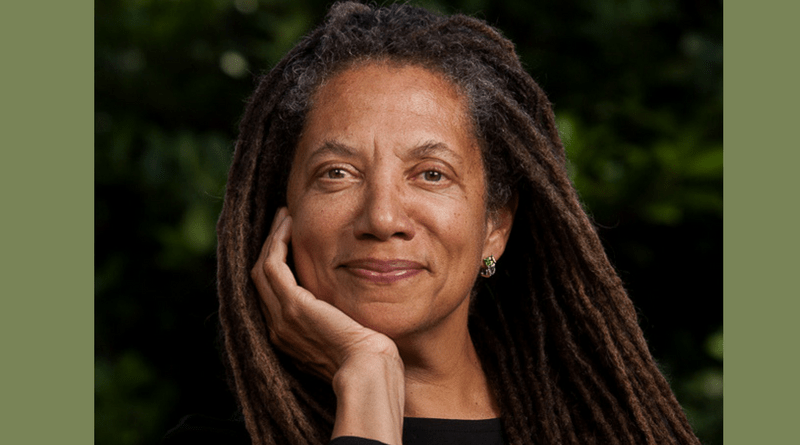Allyson Hobbs, associate professor of American history and director of African and African American Studies, hosts the Stanford Community Hour, during which she provides a space for reflection and meditation amid uncertain times, inviting experts from a variety of disciplines to share their work with the Stanford community.
Past guests have included Michael Tubbs ’12, mayor of Stockton, California, and future guests include Nicole Fleetwood, author of “Making Time: Art in the Age of Mass Incarceration” (2020) and professor of American studies and art history at Rutgers. On May 10, Nikky Finney joined Community Hour for a conversation on poetry.
Finney, a poet and scholar, is the John H. Bennett, Jr. Chair in Creative Writing and Letters and Southern Letters at the University of South Carolina. A recipient of the 2011 National Book Award for her collection “Head Off and Split” (2011), she has also authored “The World Is Round” (2003), “Rice” (1995) and “On Wings Made of Gauze” (1985).
Finney began by sharing her first experiences with poetry. A poet from a young age, she wrote poems for various occasions in her community, akin to the ancient Greek tradition of occasional poetry. Finney shared that inspiration for her poems begins with history. As a poet, she seeks to “not leave [the reader] where I found you,” and to “explore and implore.”
The current global COVID-19 pandemic was also discussed within the context of poetry. Finney discussed the changes that she has experienced as a poet, and how she has noticed that her digital readings have been able to reach a wider, more international audience. On the subject of her new book, “Love Child’s Hotbed of Occasional Poetry,” which was published near the beginning of the pandemic, she shared that, as a writer, her goal is to ensure that her work is strong enough to withstand any situation, whether it be a hurricane or a pandemic. She urges future generations of poets and writers to keep this in mind when preparing their work.
In the increasingly digital age that the pandemic has pushed the world into, Finney revealed that she has had a quietness of mind now that she has not had before, which allows her to re-read many classic texts that have influenced her. One such text is Toni Morrison’s Nobel Prize address. Reading the address, Finney was struck immensely by Morrison’s conviction that “unmolested language surges toward knowledge, not destruction.” Under current circumstances, Finney emphasizes that such “unmolested language” is especially important.
After her presentation, in a Q&A session with the audience, Finney shared further pieces of wisdom, ranging from having a routine during quarantine to the topic of modesty. When asked about how she perceives both orality and aurality in poetry, she described her experience with poetry as pulling on a word and stretching it out beyond its narrow meaning. She talked about the word “erotic” and how, beyond its common associations, it can refer to one’s awareness of and reaction to another’s skin in a visceral way.
When asked for advice on building a routine to help endure the stress of quarantine, Finney drew from the words of theologian Howard Thurman, that “the world needs for you to come alive.” For Finney, this means to trust what is true to ourselves and, in another quote from Thurman, to “wait and listen for the sound of the genuine.” She interprets “the sound of the genuine” as realizing that ourselves are the only true guide that we will ever have in this life. When writing, she urges us to trust that what we do and what we write is right for us. In a way, she phrases this as declaring to the world, “take me as I am.”
Finally, Finney shared an anecdote about being modest as an attitude in life. Having grown up hearing her mother and grandmother tell her to “be modest,” she later realized that this supposed “modesty” is merely a way to protect her heartache and rejection. She tells this lesson through a story about a girl who was asked to play the piano to open for Maya Angelou when the professional piano player fell sick. The girl, who looked up to Angelou tremendously, tried to decline to play, since she felt like she could not possibly open for Angelou. Hearing this, Angelou replied, “modesty is a lie.” It is this sentence that particularly struck Finney and prompted her to not hide behind modesty and use her voice.
For more information on Stanford Community Hour, contact Allyson Hobbes at ahobbs ‘at’ stanford.edu.
Contact Betty He at hebetty ‘at’ stanford.edu and and Maya Czeneszew at mayacz22 ‘at’ stanford.edu.
